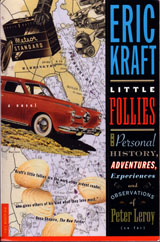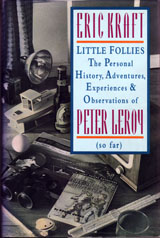

| Little Follies
The Static of the Spheres Chapter 12: A Window on the Aesthetic Soul |
by Eric
Kraft, as Peter
Leroy
|

YOU CAN READ THE FIRST HALF
YOU CAN ORDER THE
|
Guppa rubbed his hands together and reached for one of the several brown paper bags that he had brought home from the electrical gadget store. “Well, here we go,” he said. He began pulling strange and wonderful objects from the bags and arranging them in a neat array on his workbench. A few things have reappeared at intervals throughout my life, like motifs, like variations on a little phrase in a sonata. Among these are clams, of course, and a particularly unattractive plaid that first appeared on a bathing suit my mother bought me during the fat period of my childhood, and workbenches. I’ve always taken great pleasure in seeing anyone’s workbench, for a workbench is, I think, a window on one’s aesthetic soul. To be permitted to see a person’s workbench is, for me, a sign of great intimacy, particularly if the workbench is in the cellar, because merely to be invited to the cellar is a token of close affection. Guppa’s workbench was small and old. It was certainly less than half the size of Big Grandfather’s workbench. Both grandfathers kept neat, orderly workbenches, but Guppa’s style of neatness and organization differed from Big Grandfather’s. It was a case of a difference in degree producing a clear difference in style. Along shallow shelves above Big Grandfather’s workbench stood rows of identical jelly jars, each labeled to describe its contents, and each containing only items that were quite precisely alike. Big Grandfather’s level of categorization was highly refined. One jar, for example, contained only brass screws one inch long; another contained only blue steel tacks one-half inch long. Any item that Grandfather did not feel comfortable putting into an existing jar had to have a new jar of its own. As a result, many of the jars held a single item. Guppa, on the other hand, kept his supplies in large cans and large categories, such as “screws,” “springs,” and “string.” Whenever he needed a brass screw one inch long, he would dump all the screws out onto his bench and poke through them for a pleasant interval, whistling with the carefree pleasure of this simple task, until he found the screw he needed. The screw supplies of both grandfathers also offered vivid evidence of the strongest of the many attitudes that they had in common: frugality. Each grandfather had a great many screws that had been removed from household objects in the course of repair work or, if the objects were beyond repair, removed as part of a stripping operation before they were thrown out. The screws had been removed at the expense of no small labor, yet most of these salvaged screws were unusable. Their slots were so filled with paint or worn over that driving one of them into a hole would require great effort and concentration and an incredibly high tolerance for frustration. These qualities both grandfathers possessed in abundance. I do not. If I encounter difficulty in driving a screw into a wall to hold a shelf, for example, I am likely to abandon the project, to drive the screw in with a few vicious blows from a heavy hammer, or to tear the half-hung shelf off the wall and throw it through a window. And yet, in my cellar there are jars chock full of screws that are entirely unusable. Whatever it was that made it so hard for my grandfathers to throw a screw away they passed along to me. My father’s workbench was quite a different matter. It was so cluttered with tools and scraps that no work surface was exposed anymore. Since the workbench had become storage space, any work on a project had to be performed on the cellar floor or on a couple of planks thrown over a couple of sawhorses. If you had seen my father’s workbench, you might have thought that its clutter was a sign of a sloppy mind, but it was not at all; it was merely an expression of a workbench aesthetic different from my grandfathers’. My father knew more or less precisely where everything on the workbench was; he could, for example, reach behind him while he was measuring a board and grab a carpenter’s pencil with very little groping, and of the several cords that were entwined among the clutter, he could most of the time pick out the one that belonged to the tool he wanted and follow it from the plug on up to the tool itself. The two aesthetics—neatness and clutter—are at war within me, and from the state of my workbench one can tell at any time which has, temporarily, the upper hand. I was surprised and delighted to find, when Albertine and I first thought of buying the place, that Small’s Hotel had a fine, large, solid workbench. Things have a way of accumulating on this bench until the clutter resembles that on my father’s workbench, though it never quite comes up to that standard. When it reaches a certain level of clutter, a level that I can recognize quite precisely even though the contents of the clutter are never the same, I swing in the direction of my grandfathers and spend a day or two putting things in their proper places and putting old screws and nails into jars and plastic containers. Al is always delighted to see the grandfathers beginning to get the upper hand again, and while I bustle around in the cellar it is not unusual to hear her playing something sprightly on the piano in the ballroom just above me. As Guppa removed the wonderful gadgets from the paper bags, he arranged them in ranks by type, and I helped out by arranging them within the ranks by size. |

|
||

Here are a couple of swell ideas from Eric Kraft's vivacious publicist, Candi Lee Manning: Tip the author.
Add yourself to our e-mailing list.
|
Little Follies is a work of fiction. The characters, incidents, dialogues, settings, and businesses portrayed in it are products of the author’s imagination and are not to be construed as real. Any resemblance to actual events or persons, living or dead, is entirely coincidental. All rights reserved. No part of this book may be reproduced or transmitted in any form or by any means, electronic or mechanical, including photocopying, recording, or by any information storage and retrieval system, without permission in writing from the author. “My Mother Takes a Tumble,” “Do Clams Bite?,” “Life on the Bolotomy,” “The Static of the Spheres,” “The Fox and the Clam,” “The Girl with the White Fur Muff,” “Take the Long Way Home,” and “Call Me Larry” were originally published in paperback by Apple-Wood Books. Little Follies was first published in hardcover by Crown Publishers, Inc., 201 East 50th Street, New York, New York 10022. Member of the Crown Publishing Group. YOU CAN ORDER THE
For information about publication rights outside the U. S. A., audio rights, serial rights, screen rights, and so on, e-mail the author’s imaginary agent, Alec “Nick” Rafter. The illustration at the top of the page is an adaptation of an illustration by Stewart Rouse that first appeared on the cover of the August 1931 issue of Modern Mechanics and Inventions. The boy at the controls of the aerocycle doesn’t particularly resemble Peter Leroy—except, perhaps, for the smile. |
|
||||||
| . | . |